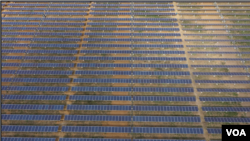Staff and patients celebrated at Beatrice Government Hospital this week after a U.S. charity known as We Care Solar installed solar power in the medical center's labor and maternity wards.
The hospital is one of more than 200 institutions that have benefited from the $3 million project by the California-based NGO.
Eighteen-year-old Bridget Dube delivered her son Rodney under the solar-powered lights Tuesday night. Two of her sisters delivered their babies when the hospital had no solar energy.
"We are really happy. This is a real relief," Dube said. "We now have solar lights which are handy when there is no electricity. Our children and those in the labor ward will no longer be in darkness."
It was difficult without solar energy because doctors struggled to help expectant mothers, she said, adding that changing diapers in the dark was difficult.
Because of recurring droughts and dilapidated power-generating equipment, Zimbabwe faces massive power outages that can go on for days.
John Mangwiro, Zimbabwe's deputy health minister, said President Emerson Mnangagwa's government is aware of the difficulties that expectant mothers and health personnel face due to the power cuts.
"(Expectant) mothers at times would be requested to bring candles," Mangwiro said. "But now there would be light permanently. ... Even mothers who were failing to come here fearing there is no light, they will be very happy to come. … We are very happy."
Dr. Laura Stachel, co-founder and executive director of We Care Solar, said her organization aims to install solar energy at more than 1,000 health institutions and maternity and labor wards in Zimbabwe.
"I think this project is going to make a great impact because it means that health workers are no longer going to struggle by candlelight or by holding their cellphones in their mouths," she said. "I think Zimbabwe [is] going to be a world leader. It's going to show the world that it is able to reach every center with reliable electricity. And we no longer have an excuse to leave people in the dark when we have a sustainable technology like solar that is simple and reliable."
We Care Solar has participated in similar projects in Liberia, Uganda and Nigeria, Stachel said, adding that maternal deaths in Nigeria fell by 70 percent at hospitals that received solar panels.




